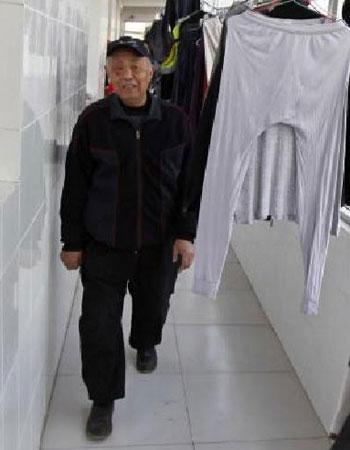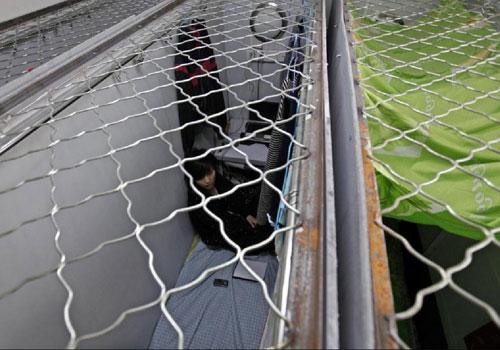On Oct 16, two philanthropists will be selling their possessions in an auction to help raise money for Chinese charities.
One is the internationally known football superstar Diego Armando Maradona, and the other is 78-year-old Beijing designer Huang Rixin.
Maradona will be selling an hour-long lunch with him when he visits this November.
Huang, in contrast, is auctioning a five-year patent to his life's work - the capsule apartments that have been capturing international media attention since last April.

Huang Rixin, a 78-year-old retired electronic engineer, walks along the corridor of capsule apartments he owns in Beijing April 22, 2010. [Photo/chinadaily.com.cn]
"I'd like to sell it even at 1 yuan (14.7 US cents)," he said.
The idea to sell the patents came to Huang after he realized that he could not pursue his work further.
He said he would like to see his work spread beyond the borders of Beijing, to the rest of China, but at 78, he says he is too old to pursue that dream.
"Since I am getting old, it was impossible for me to promote my capsule apartment across the nation. However, if someone purchases my patent, he or she can use my design and my trademark to spread the idea outside Beijing," Huang said.
The Beijing trademark authority has recently approved the trademark for the apartment, which is named after Huang, allowing him commercial use of it.
The auction for the patent will take place on Oct 16 at the same time and place where Maradona will be auctioning his hour-long lunch, though the specific place and time have not yet been determined.
"Not only will the two auctions be helping charity groups in China, but we will be able to draw a bigger crowd," said Zhao Xiaokai, general manager of CALSHY, the auction company that will hold the two auctions.
Zhao said he had been keeping an eye on Huang's capsule apartments since they were widely publicized last April.
After new regulations in May determined that the size of a rental unit cannot be smaller than 10 square meters, five times the size of the original two-square-meter units, Huang was forced to remove the capsules at the Miyu village in the Bejing suburb and replace them with what he calls the "third generation capsule apartment".
It was after seeing the third generation capsule apartment that Zhao decided it was time to "industrialize" the capsule.

"The market is huge, imagine - there will be 6 million college graduates this year. Five million of them may not find a job that will support their ability to rent housing in the city. They need cheap houses. And the situation in other big cities is much the same," Zhao said.
The average income of a college graduate in Beijing in the first half of 2010 was 2,472 yuan a month, while the average monthly rent for housing was 2,792 a month, according to a report in the Xinmin Evening News.
Zhao said they would start finding businesses and individuals for the auction on Tuesday and that any individual or company was welcome to join the auction as long as they paid a 10,000 yuan deposit before Oct 15.
Zhao said he did not expect to make any money on the auction.
"The company draws a 10 percent commission. In the case that we sell the design at 1 yuan in 30 provinces, we can only make a little money. I am doing this only to appeal to developers to build fewer villas and more cheap homes for the poor," Zhao said.
In addition, Huang said he would be offering to rent his eight capsules at 100 yuan a month at the auction, much cheaper than the normal 350 yuan a month.
"For me, money was not my first consideration, I just want more people to create better conditions for low-income people who earn less than 2,000 yuan a month," Huang said.

Wen Jiao, 22-year-old, sits in her capsule apartment in Beijing April 22, 2010. [Photo/chinadaily.com.cn]





